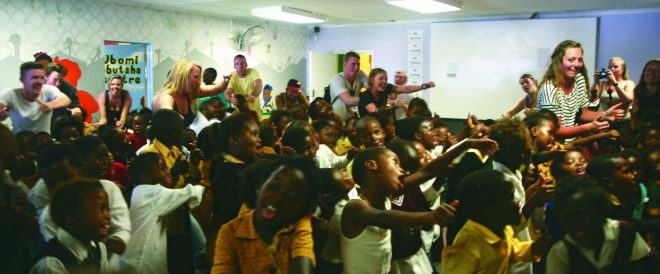 For Cherie Pettitt, a trip to South Africa as a doctoral student sparked a love affair with the country. It also made her determined to help future students have the same life-changing experience.
For Cherie Pettitt, a trip to South Africa as a doctoral student sparked a love affair with the country. It also made her determined to help future students have the same life-changing experience.
For the past three years, Pettitt and other Minnesota State Mankato faculty have led groups of undergraduate and graduate students on two-week trips to Nelson Mandela Metropolitan University (NMMU) in Port Elizabeth, South Africa, for intensive research, service learning and study programs.
“I had an opportunity to go on a study-abroad trip there, and it was really the quintessential experience of falling in love with a place,” she says. “I knew at that moment that I wanted to do study abroad programs there.”
When Pettitt joined the Minnesota State Mankato Exercise Science/Exercise Physiology faculty in 2012, she was quick to put that resolve into action.
With the help of colleagues at St. Cloud State University, where she earned her doctoral degree, and the support of her Department Chair and the Dean of the College of Allied Health and Nursing, Pettitt created a framework for an ongoing partnership with the Human Movement Sciences Department at NMMU. In 2013, Minnesota State Mankato sent a dozen students to Port Elizabeth, where they conducted research on Critical Power and Speed in Rugby Players. A group has gone every year since.
While NMMU is academically advanced, it lies in the middle of an impoverished area of a largely poor country. Visiting that area is a new experience for the students from Minnesota State Mankato as well as for many NMMU students. Pettitt says it’s a powerful experience for all of them.
“Port Elizabeth has one of the poorest townships in the world; there’s no running water and the residents all live in shanties or shacks. There are very few services there and they all have to bus into the city to work, which is often a two-hour trip,” Pettitt says. “The days in the township are really emotional. Most students cry.”
Students from both regions actively learn from each other, both academically and culturally. Nelson Mandela Metropolitan University, for example, has equipment for studying exercise that Minnesota State Mankato students don’t have access to.
“They’re really advanced in exercise and sport,” Pettitt says. “That’s one of the reasons this partnership is so great, because it’s mutually beneficial.”
Mark Kramer, lecturer of Biomechanics and Exercise Physiology at NMMU, is Pettitt’s counterpoint in South Africa. “Every year we do something different and the students gain immensely from the interaction,” he says. “[Students can] see how things are done on opposite ends of the globe. And the thing that surprises our students every time is to see how similar they all are in their passions and interests.”
The Port Elizabeth community also benefits from the partnership, Kramer says. “They are exposed and educated around their current health status and [empowered] with knowledge on what they can do about it.”
Next year, a student from NMMU will be attending Minnesota State Mankato to see how exercise education here is different. Pettitt hopes that exchange will be the beginning of an even more beneficial relationship for both parties in the future.
“This experience is so much more than just something students can put on a resume,” Pettitt says. “It changes you both as a person and as a professional. Mostly my course focuses on health disparities in the U.S. compared to the world, which of course makes sense in post-apartheid South Africa. It’s the complete experiential education package that greatly impacts a student’s development, and they’re being challenged in all of these unique ways.” —Kelly O’Hara Dyer
Speak Your Mind